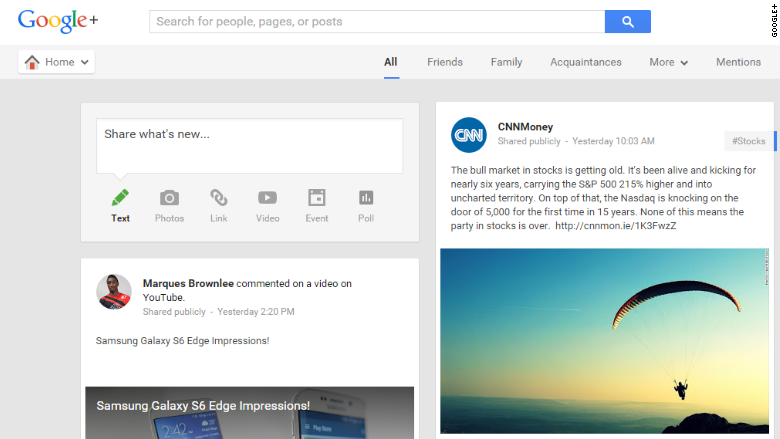
YouTube will no longer require users have a Google+ account to comment on or post videos. The conscious uncoupling is the latest attempt by Google separate its popular products from the flailing social network.
More products will announce similar changes in the coming months, Google (GOOG) said in a pair of Blogger posts announcing the unsurprising news on Monday. YouTube will be first, and users will soon be able to leave their trademark incisive and intellectual comments on videos without a Google+ account.
"We want to formally retire the notion that a Google+ membership is required for anything at Google ... other than using Google+ itself," said Google VP Bradley Horowitz on Google+.
Google has spent much of the last four years awkwardly attempting to graft Google+ onto most of its products. The attempt to take on Facebook (FB) and Twitter (TWTR) with a unifying identity across Google was met with resistance by Google users. They bristled at the sometimes clumsy roll out, social features where they were unwanted, and a controversial "real names" policy.
The public ramping-down of Google+ started last year, when Google killed the requirement that users have a Google+ account to sign up for services. At Google I/O in May, the product was barely mentioned as the shiny new Google Photos raided it for parts.
"While we got certain things right, we made a few choices that, in hindsight, we've needed to rethink," said Horowitz in the main announcement blog.
But the company insists Google+ will continue to exist. It's not going to the way of Google Buzz, Wave or Reader, at least not yet. It even recently added a new feature called Collections.
So what will remain of Google+? It will live on as a way for people with shared interests to communicate. Like Yahoo (YHOO) Groups, Facebook Groups, or Google's own neglected Google Groups.
Google+ profiles will continue to exist, so people will have to manually remove them from their other Google services. (The company promises an easier way to de-Google+ your accounts in the future.) Hangouts, the service's breakout feature, is already an independent app. It will gain some of Google+'s location features.

